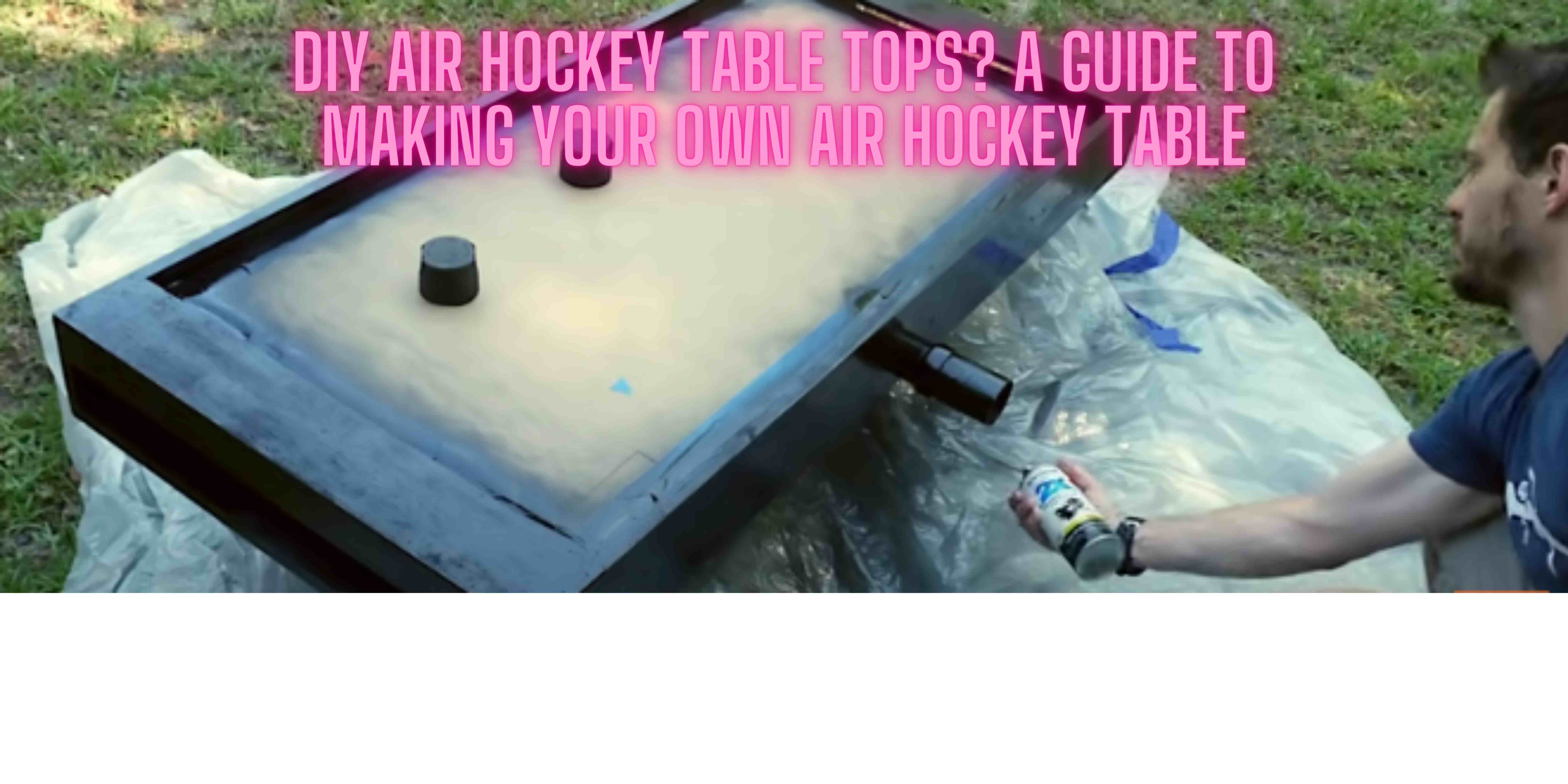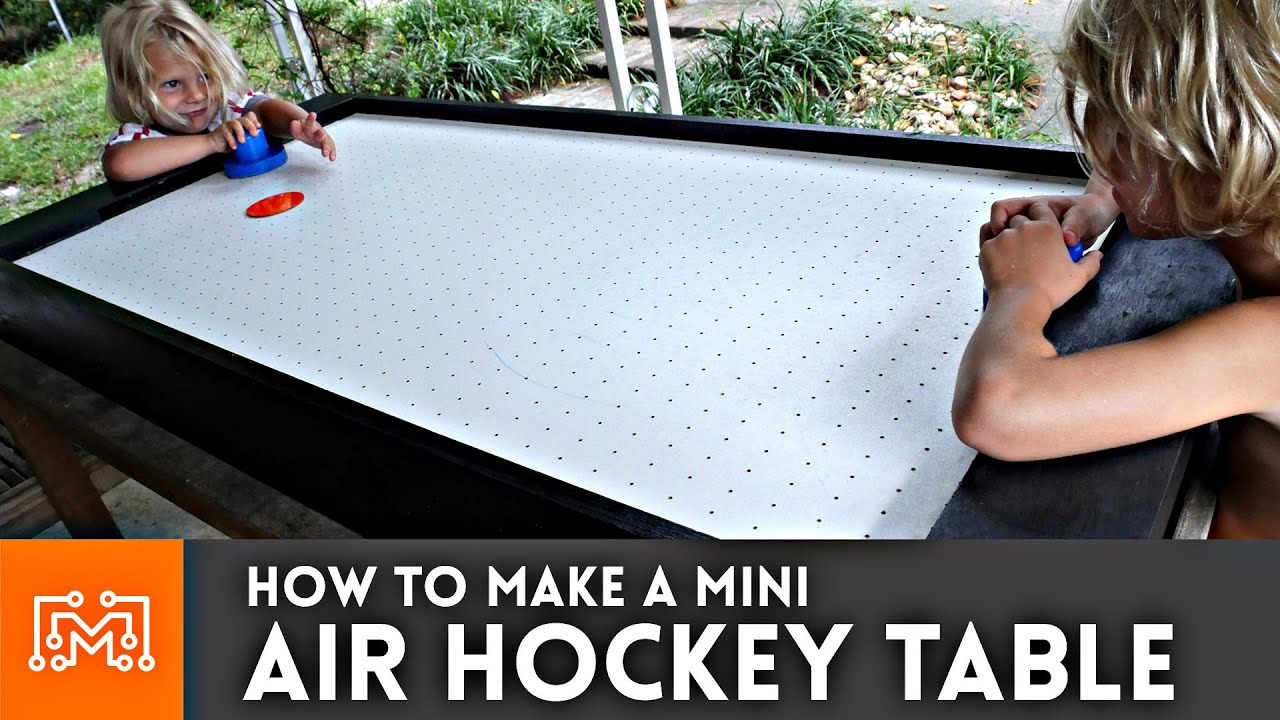DIY Air Hockey Table Tops? A Guide To Making Your Own Air Hockey Table
Due to the sophisticated systems required to operate it, a professional air hockey setup is typically only available in arcades. The objective was to create a DIY air hockey table tops in order to bring this gaming experience into the home.
Author:Iram MartinsReviewer:Frazer PughFeb 18, 2022138.2K Shares2.6M Views

Due to the sophisticated systems required to operate it, a professional air hockey setup is typically only available in arcades. The objective was to create a DIY air hockey table topsin order to bring this gaming experience into the home.
By utilizing readily available materials, you can create a low-cost, easy-to-assemble air hockey table.
There is no greater joy than watching the puck glide effortlessly through the air and into the goal. Continue on to create your own air hockey game, and we can assure you that it will provide hours of entertainment!
Materials Needed
- Wooden Frame
- Two long sides: L 90”, W 2”, H 3”
- Two short sides L 46”, W 2”, H 3”
- Two long sides; L 87”, W 1”, H 2”
- Two short sides; L 43”, W 1”, H 2”
- A white marker board with L 87”, W 43”, H 0.5” for a smooth surface
- Scrap wood with H 2”
- Pine board with L 87” W 43” H 2”
- Leaf blower
- 4ft long tube with a 3” diameter. This measurement depends on the size of the leaf blowers’ outlet
- An 8” by 8” PVC sheet with a hole for the tube
- PVC muff
- Two 8” by 8” plywood pieces
- Wooden beams of L 13”
- Two 13” by 13” fabric pieces (get strong ones)
- Tools
- Jigsaw
- Wood glue
- Wood screws
- Nails
- Hot glue gun
- Tape Measure
- Drill with 1mm drill bits.
- Duct tape
Build Your Table
Frame
The beams should have 45-degree edges to fit together perfectly – this is best left to a professional. If you have a white marker board, position it on level ground and then align the smaller beams against it to ensure they are the correct size.
Connect the smaller beams to the larger beams. Glue all four sides together and allow them to dry. Drill pilot holes in the corners and then screw in some screws.
Drill Holes
On the marker board, create a 1" grid. Drill holes for air circulation at each intersection.
Attach Pillars
Arrange your scraps 2" from the board's edge, leaving a 3" space between each one. Using regular wood glue, adhere the scraps to the board and then place the pine board on top to keep the scraps upright while the glue hardens.
Attach The Surface
Tape the holes closest to the whiteboard's margins to prevent them from being blocked by the glue (do this on the reverse side). Apply glue to the edges and slide the pillars downward. Nail five nails into the board's short side and ten nails into the board's long side to secure it to the smaller frame.
Make Your Inlet
Hot glue the muff to the tube and then duct tape the tube to the leaf blower's outlet to make it detachable. Drill holes in both pieces of plywood, ensuring that the holes are larger than the holes in the PVC sheet. Drill a hole through the pine board large enough to accommodate your air inlet.
Drill two holes in the plywood, one with four and one with eight drill bits.Carry out the same procedure with your PVC sheet.
Glue and screw the one with four holes onto the pine board. Place the PVC sheet and the piece with the eight holes on top of the first one, ensuring that the holes are aligned before screwing them down.
Attach The Pine Board
Remove the tape from the whiteboard and sweep the area clean. Apply wood glue to each pillar and the frame's margins, then slide your board into place gently. Place something heavy on it and allow it to dry.
Make The Goals
Drill holes 12 cm from the center of your framework and then use a jigsaw to level it with the playing surface. Then, using the strong fabric between the 13" beams, nail them over and under the cut to create the puck catcher.

Mini Air Hockey Table // How-To | I Like To Make Stuff
Conclusion
If you followed the instructions precisely, you should now have a homemade air hockey table top. You can line the framework with aluminum or plastic bounce-off strips to replicate the rebound effect found on store-bought tables and customize your table design.
Please keep in mind that the measurements may not be accurate for you. Therefore, feel free to adapt them to your specific needs and materials.

Iram Martins
Author
Iram Martins is a seasoned travel writer and explorer with over a decade of experience in uncovering the world's hidden gems. Holding a Bachelor's degree in Tourism Management from the University of Lisbon, Iram's credentials highlight his authority in the realm of travel.
As an author of numerous travel guides and articles for top travel publications, his writing is celebrated for its vivid descriptions and practical insights.
Iram’s passion for cultural immersion and off-the-beaten-path adventures shines through in his work, captivating readers and inspiring wanderlust.
Outside of his writing pursuits, Iram enjoys learning new languages, reviewing films and TV shows, writing about celebrity lifestyles, and attending cultural festivals.

Frazer Pugh
Reviewer
Frazer Pugh is a distinguished expert in finance and business, boasting over 6 years of experience. Holding an MBA in Finance from Stanford University, Frazer's credentials underscore his authority and expertise in the field.
With a successful track record in executive roles and as a published author of influential articles on financial strategy, his insights are both deep and practical.
Beyond his professional life, Frazer is an avid traveler and culinary enthusiast, drawing inspiration from diverse cultures and cuisines.
His commitment in delivering trustworthy analysis and actionable advice reflects his dedication to shaping the world of finance and business, making a significant impact through his work.
Latest Articles
Popular Articles